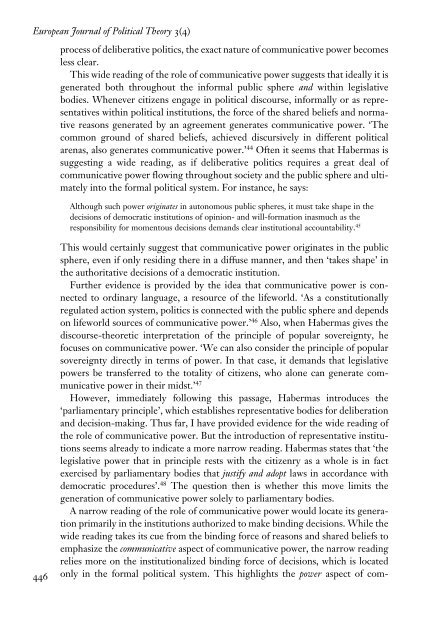Communicative Power in Habermas's Theory of Democracy
Communicative Power in Habermas's Theory of Democracy
Communicative Power in Habermas's Theory of Democracy
Create successful ePaper yourself
Turn your PDF publications into a flip-book with our unique Google optimized e-Paper software.
European Journal <strong>of</strong> Political <strong>Theory</strong> 3(4)process <strong>of</strong> deliberative politics, the exact nature <strong>of</strong> communicative power becomesless clear.This wide read<strong>in</strong>g <strong>of</strong> the role <strong>of</strong> communicative power suggests that ideally it isgenerated both throughout the <strong>in</strong>formal public sphere and with<strong>in</strong> legislativebodies. Whenever citizens engage <strong>in</strong> political discourse, <strong>in</strong>formally or as representativeswith<strong>in</strong> political <strong>in</strong>stitutions, the force <strong>of</strong> the shared beliefs and normativereasons generated by an agreement generates communicative power. ‘Thecommon ground <strong>of</strong> shared beliefs, achieved discursively <strong>in</strong> different politicalarenas, also generates communicative power.’ 44 Often it seems that Habermas issuggest<strong>in</strong>g a wide read<strong>in</strong>g, as if deliberative politics requires a great deal <strong>of</strong>communicative power flow<strong>in</strong>g throughout society and the public sphere and ultimately<strong>in</strong>to the formal political system. For <strong>in</strong>stance, he says:Although such power orig<strong>in</strong>ates <strong>in</strong> autonomous public spheres, it must take shape <strong>in</strong> thedecisions <strong>of</strong> democratic <strong>in</strong>stitutions <strong>of</strong> op<strong>in</strong>ion- and will-formation <strong>in</strong>asmuch as theresponsibility for momentous decisions demands clear <strong>in</strong>stitutional accountability. 45446This would certa<strong>in</strong>ly suggest that communicative power orig<strong>in</strong>ates <strong>in</strong> the publicsphere, even if only resid<strong>in</strong>g there <strong>in</strong> a diffuse manner, and then ‘takes shape’ <strong>in</strong>the authoritative decisions <strong>of</strong> a democratic <strong>in</strong>stitution.Further evidence is provided by the idea that communicative power is connectedto ord<strong>in</strong>ary language, a resource <strong>of</strong> the lifeworld. ‘As a constitutionallyregulated action system, politics is connected with the public sphere and dependson lifeworld sources <strong>of</strong> communicative power.’ 46 Also, when Habermas gives thediscourse-theoretic <strong>in</strong>terpretation <strong>of</strong> the pr<strong>in</strong>ciple <strong>of</strong> popular sovereignty, hefocuses on communicative power. ‘We can also consider the pr<strong>in</strong>ciple <strong>of</strong> popularsovereignty directly <strong>in</strong> terms <strong>of</strong> power. In that case, it demands that legislativepowers be transferred to the totality <strong>of</strong> citizens, who alone can generate communicativepower <strong>in</strong> their midst.’ 47However, immediately follow<strong>in</strong>g this passage, Habermas <strong>in</strong>troduces the‘parliamentary pr<strong>in</strong>ciple’, which establishes representative bodies for deliberationand decision-mak<strong>in</strong>g. Thus far, I have provided evidence for the wide read<strong>in</strong>g <strong>of</strong>the role <strong>of</strong> communicative power. But the <strong>in</strong>troduction <strong>of</strong> representative <strong>in</strong>stitutionsseems already to <strong>in</strong>dicate a more narrow read<strong>in</strong>g. Habermas states that ‘thelegislative power that <strong>in</strong> pr<strong>in</strong>ciple rests with the citizenry as a whole is <strong>in</strong> factexercised by parliamentary bodies that justify and adopt laws <strong>in</strong> accordance withdemocratic procedures’. 48 The question then is whether this move limits thegeneration <strong>of</strong> communicative power solely to parliamentary bodies.A narrow read<strong>in</strong>g <strong>of</strong> the role <strong>of</strong> communicative power would locate its generationprimarily <strong>in</strong> the <strong>in</strong>stitutions authorized to make b<strong>in</strong>d<strong>in</strong>g decisions. While thewide read<strong>in</strong>g takes its cue from the b<strong>in</strong>d<strong>in</strong>g force <strong>of</strong> reasons and shared beliefs toemphasize the communicative aspect <strong>of</strong> communicative power, the narrow read<strong>in</strong>grelies more on the <strong>in</strong>stitutionalized b<strong>in</strong>d<strong>in</strong>g force <strong>of</strong> decisions, which is locatedonly <strong>in</strong> the formal political system. This highlights the power aspect <strong>of</strong> com-
















